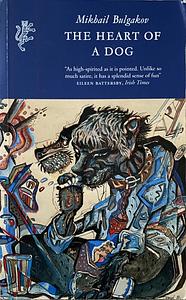Take a photo of a barcode or cover
I have read this book twice, and it is just amazing. It is satire at its best, from the best.
dark
funny
fast-paced
Plot or Character Driven:
A mix
Strong character development:
Yes
Loveable characters:
No
Diverse cast of characters:
Yes
Flaws of characters a main focus:
Complicated
dark
funny
reflective
fast-paced
Plot or Character Driven:
Plot
Strong character development:
Complicated
Loveable characters:
No
Diverse cast of characters:
No
Flaws of characters a main focus:
Yes
Despite what my rating may indicate, I really enjoyed this book. The only reason why it is not rated higher is because it didn’t really stick with me — and I don’t think it was necessarily meant to. This is no Master and Magarita, though I would definitely say it was an enjoyable read.
I think a good bit of the humor/satire was lost on me because I am not an upper class Muscovite in the 20s. I also think that humor is very difficult to translate, and especially so with a writer as skilled and specific as Bulgakov. My Russian is not good enough yet to read it in the original, but if you can, I would recommend you do that, especially for this book.
The satire definitely still landed for me. I don’t think it was the most biting or interesting satire of the Soviet Union to come out of that time, but it’s a fun read.
I think a good bit of the humor/satire was lost on me because I am not an upper class Muscovite in the 20s. I also think that humor is very difficult to translate, and especially so with a writer as skilled and specific as Bulgakov. My Russian is not good enough yet to read it in the original, but if you can, I would recommend you do that, especially for this book.
The satire definitely still landed for me. I don’t think it was the most biting or interesting satire of the Soviet Union to come out of that time, but it’s a fun read.
Graphic: Medical content, Alcohol
Moderate: Cursing, Violence
challenging
dark
funny
lighthearted
tense
fast-paced
Plot or Character Driven:
Plot
Strong character development:
Complicated
Loveable characters:
Complicated
Diverse cast of characters:
Yes
Flaws of characters a main focus:
Complicated
Not as ambitious as Master & Margarita and not as funny as The Fatal Eggs, The Heart of a Dog nonetheless has plenty of Bulgakov satirical absurdity, wicked fun, and biting puns. Where it might fall short, at least for me, is in its shifting focus which can perplex readers who wish to follow its themes.
The first portion of the novella is from the creative and absurd perspective of the titular dog, a stray adopted and offered a lavish lifestyle before the experiment. Furball's sensibility is common, gustatory, and apprehensive at all the wrong moments (not unlike many humans). When subjected to an operation and granted human pituitary and sexual organs, the resulting transformation is matched by a move in point of view. We oddly read much of his progress through the documents of the doctor. Finally, when we see the final incarnation of Poligraf Poligrafovich Furballov (!), we are offered a third person point of view of the action, where our titular victim now externalizes a wide range of offensive opinions and invective.
The result is a work with satirical themes around the dehumanizing work of politics, the politics of class and of science, eugenics, and the normalizing of manners and propriety to protect it all. Another work of Bulgakov which was never published in his lifetime but offered about in the underground samizdat, it is easy to understand both its appeal and repression. Need a quick read that offers some intellectual chuckles? This is a good choice.
The first portion of the novella is from the creative and absurd perspective of the titular dog, a stray adopted and offered a lavish lifestyle before the experiment. Furball's sensibility is common, gustatory, and apprehensive at all the wrong moments (not unlike many humans). When subjected to an operation and granted human pituitary and sexual organs, the resulting transformation is matched by a move in point of view. We oddly read much of his progress through the documents of the doctor. Finally, when we see the final incarnation of Poligraf Poligrafovich Furballov (!), we are offered a third person point of view of the action, where our titular victim now externalizes a wide range of offensive opinions and invective.
The result is a work with satirical themes around the dehumanizing work of politics, the politics of class and of science, eugenics, and the normalizing of manners and propriety to protect it all. Another work of Bulgakov which was never published in his lifetime but offered about in the underground samizdat, it is easy to understand both its appeal and repression. Need a quick read that offers some intellectual chuckles? This is a good choice.
Very weird. Very metaphorical. Very “Animal Farm” but also not at all. Philip Philipovitch is terrible for taking away the dog’s agency and making him human but also terrible for then reversing the experiment. The dog was happy as a dog and happy as a man, but his morals as a man made him a terrible person we’re supposed to dislike while we are more likely to sympathize with the dog. Considering it’s historical context in Stalin-era Russia, the book’s satire is especially biting.
The long-banned piece of speculative fiction by the Russian author Bulgakov. Written in 1925, but suppressed by the Soviet state for its clear anti-Soviet sentiment, this book has only come to light relatively recently. It is similar in some ways to HG Wells’ The Invisible Man, or Shelly’s Frankenstein, in that the central action revolves around science that tests the boundaries of humanity. Two doctors find a stray dog in Moscow and replace its testes and pituitary gland with that of a just-deceased human’s. The eventual result is a dog which becomes a man - a scoundrel of a man, a rude, vicious drunkard, and one who just happens to fall into the philosophy and workings of the nascent Soviet society/Party. In this way, the story is not really about the horrors of scientific experiment on a human, at least not in the same way as Wells’ or Shelly’s stories. But it is about the dangers of the “scientific” attempt to recreate humanity, as Bulgakov believed was happening in Russia. He reserves the greatest ire for Sharikov - the dog-man - and Shvonder, the head of the new housing committee in the doctor’s apartment. Both of these reprehensible characters espouse Party philosophy, the former because it will serve his rapacious appetites, the latter because, presumably, he really believes in it. It is a deeply satirical story, racing with action and fury and a wide variety of mixed narrative perspectives, which was immediately (and somewhat understandably) censored by the State it was critiquing so effectively. There is something in the message of the book for us today as well. Our humanity may not be played with - on a personal or societal scale - without drastic consequences. It is a message we should heed with utmost care.
adventurous
emotional
funny
reflective
fast-paced
Plot or Character Driven:
A mix
Strong character development:
Yes
Loveable characters:
Complicated
Diverse cast of characters:
No
Flaws of characters a main focus:
Yes
I think about this book so often
funny
lighthearted
Coming to this novella after reading [b:The Master and Margarita|198428|The Master and Margarita|Mikhail Bulgakov|https://i.gr-assets.com/images/S/compressed.photo.goodreads.com/books/1562016322l/198428._SY75_.jpg|876183], I would say that Bulgakov is indeed the master of satire. If his magnum opus tries to rebuke Soviet’s state atheism, then this book takes it a bit slower with the critique on the imposition of Bolshevism during the early stage of the Soviet Union. Unlike The Master and Margarita which had been an object of constant rewriting process until the time of Bulgakov’s death in 1940, The Heart of A Dog is a finished novel which Bulgakov initially planned to publish in 1925. During the first three years after the end of the Russian Civil War, the censorship in the Soviet Union has not matured yet. But it was unfortunate that Bulgakov’s lost the opportunity to publish this work during his lifetime as NKVD began to hunt for any authors who threatened the stability of the Union through their works.
Bulgakov was a medical doctor, who finished his medical education in 1916 amidst the First World War. He volunteered for a while in the years that followed during the Russian Civil War which happened after the October Revolution of 1917, first for the White Guard and then for the Red Army. His experience as a doctor speaks volume about his choice of allegory for his satire in this book and the attitude of the main character towards Bolshevism. Philip Philipovich Preobrazhensky is a successful doctor in the Moscow establishment. He takes a stray dog into his apartment and conducts an experiment on the dog. First, by implanting human testes to replace the dog’s original. And the second one would be to replace the pituitary gland of the dog with a human’s. The result: the dog turns into a bizarre creature.
Philip Philipovich’s experiment kinda sounds like Victor Frankenstein’s in creating a new creature, without any clear purpose, which will then inflict fatal consequences to him.
The dog begins to turn into a human. He begs to be called by name, Poligraph Poligraphovich Sharikov. Not only that, he asked to be compensated with a job, as a staff at the City Cleansing Department. It was not at all clear since when, suddenly the dog’s behaviour has been a brain drain to Philip Philipovich and his assistant Ivan Arnoldovich, as well as the two women living in Philip Philipovich’s apartment: Zinaida Bunina and Darya Ivanova. The problem is that: the dog still possesses the heart of a dog.
Drawing a parallel from the stage of development of the Soviet Union during the book was written in 1925, it is not difficult to see the satire that Bulgakov had meant to tell, about the immature stage of Soviet-style state-imposed socialism. I took notice that Philip Philipovich’s imposition of his operation to the dog, Sharikov, as a similar case to state-imposed socialism. We could now fairly say that the socialist experiment did not end well in the Soviet Union and its former satellite states in Eastern Europe with the collapse of the Eastern Bloc during the early 1990s.
At its early stage, Bulgakov had seen it clearly that based on empirical evidence, there will be reactions to an immature system, just like the dog’s reaction to his being turned into a human-like creature.
Anyway, it remains obscure to me that Bulgakov has survived Stalin’s Great Purge in which many of his political oppositions were killed during the late 1930s. Perhaps Stalin himself enjoyed Bulgakov’s satire, which provides a loyal opposition to Socialist Realism. He was never denounced nor arrested, until his death in 1940. And even Stalin himself personally made a phone call to him, offering a job as an assistant director at the Maly Teatr in Moscow. Any readers who have read The Master and Margarita will surely be able to appreciate this novella, which is being told only in 128 pages. It is funny (if ‘funny’ is the word), and I laughed a lot during the time I read it. Unlike The Master and Margarita, this book is more straightforward with its critics towards the Soviet establishment, which might be the reason why it was not allowed to be published until 1968, 28 years after Bulgakov’s death. This novella is a really good laugh to be read in a single sitting!
Bulgakov was a medical doctor, who finished his medical education in 1916 amidst the First World War. He volunteered for a while in the years that followed during the Russian Civil War which happened after the October Revolution of 1917, first for the White Guard and then for the Red Army. His experience as a doctor speaks volume about his choice of allegory for his satire in this book and the attitude of the main character towards Bolshevism. Philip Philipovich Preobrazhensky is a successful doctor in the Moscow establishment. He takes a stray dog into his apartment and conducts an experiment on the dog. First, by implanting human testes to replace the dog’s original. And the second one would be to replace the pituitary gland of the dog with a human’s. The result: the dog turns into a bizarre creature.
Philip Philipovich’s experiment kinda sounds like Victor Frankenstein’s in creating a new creature, without any clear purpose, which will then inflict fatal consequences to him.
‘I’m sorry, professor, but citizen Sharikov is absolutely correct. He has a right to take part in a discussion about his affairs, especially as it’s about his identity documents. An identity document is the most important thing in the world.’
The dog begins to turn into a human. He begs to be called by name, Poligraph Poligraphovich Sharikov. Not only that, he asked to be compensated with a job, as a staff at the City Cleansing Department. It was not at all clear since when, suddenly the dog’s behaviour has been a brain drain to Philip Philipovich and his assistant Ivan Arnoldovich, as well as the two women living in Philip Philipovich’s apartment: Zinaida Bunina and Darya Ivanova. The problem is that: the dog still possesses the heart of a dog.
Drawing a parallel from the stage of development of the Soviet Union during the book was written in 1925, it is not difficult to see the satire that Bulgakov had meant to tell, about the immature stage of Soviet-style state-imposed socialism. I took notice that Philip Philipovich’s imposition of his operation to the dog, Sharikov, as a similar case to state-imposed socialism. We could now fairly say that the socialist experiment did not end well in the Soviet Union and its former satellite states in Eastern Europe with the collapse of the Eastern Bloc during the early 1990s.
‘Science has not yet found the means of turning animals into people. I tried, but unsuccessfully, as you can see. He talked and then he began to revert back to his primitive state. Atavism.’
At its early stage, Bulgakov had seen it clearly that based on empirical evidence, there will be reactions to an immature system, just like the dog’s reaction to his being turned into a human-like creature.
Anyway, it remains obscure to me that Bulgakov has survived Stalin’s Great Purge in which many of his political oppositions were killed during the late 1930s. Perhaps Stalin himself enjoyed Bulgakov’s satire, which provides a loyal opposition to Socialist Realism. He was never denounced nor arrested, until his death in 1940. And even Stalin himself personally made a phone call to him, offering a job as an assistant director at the Maly Teatr in Moscow. Any readers who have read The Master and Margarita will surely be able to appreciate this novella, which is being told only in 128 pages. It is funny (if ‘funny’ is the word), and I laughed a lot during the time I read it. Unlike The Master and Margarita, this book is more straightforward with its critics towards the Soviet establishment, which might be the reason why it was not allowed to be published until 1968, 28 years after Bulgakov’s death. This novella is a really good laugh to be read in a single sitting!
dark
funny
mysterious





